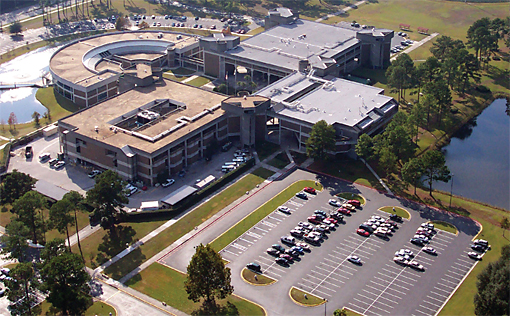| 제목 | [DAIKIN] HIGHER EDUCATION - Florida Community College | 작성일 | 16-06-16 13:44 |
| 글쓴이 | 최고관리자 | 조회수 | 4,916 |
본문
The Daikin Magnitude chiller and central plant serves four buildings at the North Campus of the Florida Community College at Jacksonville, spanning 350,000 ft2 of space, including classrooms, an auditorium, faculty and administrative offices, nursing labs, a culinary facility and bookstore.
CASE STUDY
Higher Education
Name
Florida Community College North Campus
Location
Jacksonville, FL USA
Facility Size
Four buildings, 350,000 ft2
Issue
Replace aging centrifugal chillers while meeting budget and energy-savings goals
Solution
Replace CFC centrifugal chiller with 300 ton Daikin Magnitude® magnetic bearing chiller
Florida Community College upgrades to Daikin chiller for energy savings and quiet learning environment
Florida Community College at Jacksonville (FCCJ), second largest in Florida's 28 community colleges, needed to upgrade and modernize the chiller plant at its showcase North Campus. As part of the renovation plan, the campus turned to Daikin and its Magnitude chiller technology to replace one of three chillers, yielding substantial energy savings and noise reduction.
North Campus is one of the largest of the College's four physical campuses, serving 6,000 students in more than a half-dozen major buildings. The campus is well known in the state for its nursing and health-related programs, according to Campus President, Dr. Barbara Darby.
After conducting an extensive engineering study and energy audit in 2004, the campus considered a number of upgrade scenarios to its chiller plant and building automation system according to Mark Gandy, the North Campus HVAC facilities manager. However, the original recommendations for a chiller replacement from the study failed to meet budget or energy-savings requirements.
Energy Savings Summary

Electrical usage
519,514 kWh reduced during the first six months
Energy savings after chiller replacement
30-40% annually
During the evaluation process, the project team, led by the college's mechanical engineer Geng Liu (presently with California State University) and FCCJ Project Manager Ed Rock visited another Florida college and saw the performance of the Daikin Magnitude, magnetic bearing compressor chiller. After seeing first-hand the impressive energy efficiency and quiet operation of that unit, the project team reconfigured its plan to incorporate the Daikin chiller.
The new 300-ton Daikin Magnitude, magnetic-bearing chiller replaced a low-pressure centrifugal chiller that used a CFC refrigerant. The project team also noted that the Daikin chiller uses R-134a, a refrigerant with no phase-out schedule and no ozone depletion potential. This new compressor design is oil-free which eliminates the lubrication system and its inherent problems and maintenance.
"In the past, we've held to a particular centrifugal chiller manufacturer around the campus system," Gandy says. "This is the first large centrifugal chiller from another vendor that we've purchased, and based on this new oil-free and Magnitude technology, the North Campus will now lead the way on lowered electrical costs."
The best and only solution
The Daikin Magnitude chiller emerged as the clear choice for a part-load chiller which was a key point for the project team. The high efficiency of this machine at part-load conditions allows the college to select it as the lead machine during true part-load conditions, supplemented by two older base-load centrifugal chillers that serve the main buildings on the 160-acre campus. According to the Daikin representative for the project from Brooks Air Systems, Inc., of Jacksonville, the replacement of a 30-year-old CFC-refrigerant chiller with the Daikin Magnitude chiller was the perfect solution as a part-load chiller in a multi-chiller central energy plant.
The new Daikin unit was installed in January 2007, and fully commissioned in June 2007 after significant retrofitting, integration and testing with the campus building automation system. "The project wasn't just a replacement of one chiller. We also did a major reconstruction of the plant," Gandy explains. The project included replacement of pumps and the transformation from a constant-volume system (or primary system) to a primary-secondary (or decoupled) system."We also installed variable frequency drives on the secondary pumps for additional energy savings."
The project required some unique and challenging work schedules for the campus that were coordinated through Willie Jacobs, Senior Supervisor of the Campus Plant. Jacobs credits the stellar work of the team at W.W. Gay Mechanical, including project manager Wes Shaver, on the successful integration of the new Daikin plant with the campus building automation system. The project requirements included a revision of the building automation system (BAS) explains Wayne Cook, service administrator at W.W. Gay Mechanical in Jacksonville, Fla.
This allowed for smoother operation of all chillers, pumps and cooling tower cells, while eliminating the potential high costs of dual-control solutions to equipment operations."W.W. Gay Mechanical's expertise with a number of BAS manufacturers allowed it to integrate systems at the FCCJ North Campus. Cook says: "The new Daikin chiller was equipped with BACnet® communications and KMC's BACnet products were already on site and in operation."As a result, the Daikin chiller easily communicates with the existing KMC controls which communicate with the Trane® building automation system, using the BACnet standard open protocol over the college's
Ethernet LAN.
This integration project entailed many hours of programming and performance testing by Mark Gandy, North Campus electrician Ronald Colleton, and Joe Shepard of W.W. Gay. Cook points out that there was no downtime of the chiller plant during the performance test and commissioning process, and no loss of comfort in the campus buildings.
The resulting system provided a precise level of control to the plant: the enhanced controls system monitors each chiller's energy usage in Btuh, as well as the total Btuh of the entire chiller plant.
Class in progress
Space and noise requirements both impacted the decision to choose the Daikin chiller. Low sound levels were a big requirement for the new chiller because the plant is located in the third-floor of a classroom building. "Once we realized that we couldn't relocate the chiller plant to the first floor of the buildings because of cost, noise became an issue.
The Daikin Magnitude chiller has the quietest sound levels in the industry with sound pressure ratings as low as 77 dBA per AHRI Standard 575. The magnetic bearings of the compressor eliminate the metal-to-metal contact noise of conventional bearings. The resulting ultra-quiet operation of the Daikin chiller provides an environment for students to study and learn, supporting the school district's main goal of education.
Another key factor in the selection of the Daikin chiller was its compact design. Any new unit had to be compact enough to fit through a 42- inch door. "We easily got the chiller in without the compressors. The two compressors were then carried in and bolted on the machine," Gandy says. The old machine was cut into pieces and removed by crane.
Adding up the savings—one third energy reduction
All told, the Daikin Magnitude chiller and plant serves four buildings spanning some 350,000 ft2 of space, including classrooms, an auditorium, faculty and administrative offices, nursing labs, a culinary facility and bookstore. Its efficient performance has contributed to significant energy savings at the college. North Campus has reduced its electrical usage during the first six months by 519,514 kWh. "The Daikin chiller contributes approximately 30 to 40 percent of our energy savings for the entire system upgrade,"according to Gandy.
"All the way around, it's energy reduction with the Daikin Magnitude chiller," he says. "For example, when the Daikin chiller starts up, it pulls only two amps of electricity. And the part load performance is probably one of the best in the industry at 0.326 kW per ton."
The proven energy savings and chiller performance at FCCJ NorthCampus have the college considering the Daikin Magnitude chiller to replace older, inefficient chillers at other campus locations. "Daikin should be commended on going with this particular design," Gandy concludes. "It's a unique machine and one of the major steps forward in chiller technology."

The inner courtyard of the Florida's Community College at Jacksonville, North Campus. The efficient performance of the Daikin Magnitude chiller has contributed to significant energy savings at the college, reducing the electrical usage of the North Campus during the first six months by 519,514 kWh.
| 이전글 | [DAIKIN] HIGHER EDUCATION - Flagler College 2016-06-16 | ||
| 다음글 | [DAIKIN] HIGHER EDUCATION - Pima Community College 2016-06-16 | ||






